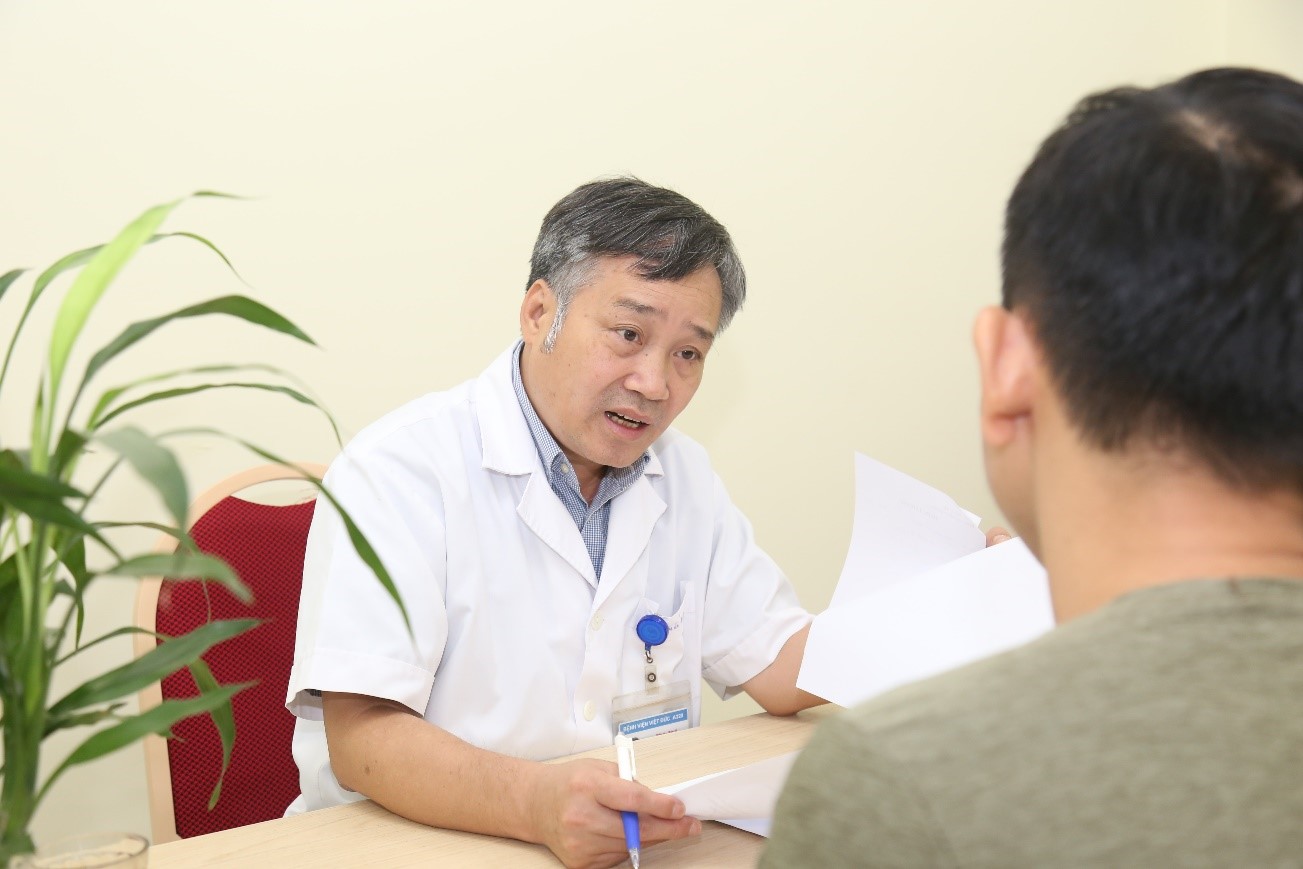Cholelithiasis and dangerous complications
12/09/2019 17:06
Cholelithiasis are the bile pigments deposited in the bile ducts that form stones , causing stagnation and obstruction of bile circulation (cholestasis) . This is one of the most common gallbladder pathologies in tropical countries. In recent years, the diagnosis and treatment of gallstones has made a lot of progress, but the proportion of patients hospitalized for gallstone disease has not decreased.
According to Dr. Do Tuan Anh, PhD – Chief of Department of Hepato – Biliary Surgery, Viet Duc University Hospital: Some cases of gallbladder stones (gallstones) or intrahepatic stones have no obvious symptoms but when there are symptoms of pain that persist in the right flank area: dull or severe pain spreads to the back or epigastric ; high fever, jaundice, yellow urine, etc. are also the times when gallstones cause serious complications. Particularly for stones in the main bile ducts, including the common bile duct stones, the common hepatic duct stones and the right and left hepatic ducts, even if they appear early, they may cause more severe symptoms than the stones in the gallbladder. Type of pathology that causes dangerous complications such as infectious shock, peritonitis, biliary necrosis and surgical intervention should be provided as soon as possible.
In every person, the expression of gallstones is not the same. Besides, the location of stones also leads to different signs of the disease. However, some typical symptoms of gallstones include:
– Right flank pain: Pain usually occurs in the lower right flank or epigastric spread to the right shoulder up and back. The nature of pain is usually dull or intense depending on where the stone appears.
– Fever, chills: People with gallstones may have fever, colds due to biliary tract infection or cholecystitis. Patients often have a fever higher than 38 degrees Celsius with chills, sweating a lot after the fever subsides.
– Gastrointestinal disorders: Some patients with gallstones experience symptoms of fear of grease, heartburn, bloating, indigestion … These symptoms are easily confused with some diseases related to the gastrointestinal tract, stomach pain. Many people apply inappropriate treatments.
– Jaundice: Depending on the progression of gallstones, the level of jaundice of the patient are various. This symptom is often accompanied by severe itching.

Dr. Do Tuan Anh, PhD said the detection of symptoms will support effective treatment, prevent dangerous complications
Dr. Do Tuan Anh, PhD said the detection of symptoms will support effective treatment, prevent dangerous complications like:
Acute complications:
– Peritoneal bile infiltration or biliary peritonitis (Choleperitonitis) : Biliary obstruction and infection due to stones lead to increased pressure in the bile ducts, damaging the biliary tract, through which infected bile fluid can penetrate into the peritoneal cavity cause abdominal infection, in severe cases, biliary necrosis can cause biliary peritonitis.
– Acute pancreatitis caused by stones: A very common complication, including acute edematous pancreatitis and necrotic form. Necrotic pancreatitis can easily lead to septic shock, which can even be fatal. Patients with severe pain, excessive vomiting and epigastric spasticity are accompanied by symptoms of cardiac collapse in severe cases.
– Bleeding of the bile ducts: Patients with symptoms of gallstones and vomiting blood and black stools, typically pencil-shaped blood clots. Duodenal examination revealed blood in the duodenum originating from the biliary tract.
– Cholangitis and hepatic biliary abscess: In tropical countries, cholangitis is common in biliary tract diseases. In cholangitis, the causes are stones leading (77.78 – 97.52%). Patients with severe pain in the liver area, a serious infection: high fever, chills, dry lips, dirty tongue, exhausted condition due to lack of water and intoxication.
– Biliary tract shock is a serious complication, accounting for 16 – 24%. The majority meet in older adults, 75% in those over 50. Interstitial biliary shock is a leading cause of death for patients, common in patients with gallstones, severe fever but not treated promptly.
Chronic complications:
– Biliary cirrhosis: A disease in which the biliary tract is gradually destroyed, the destruction of the biliary tract can cause toxic substances to accumulate in the liver and sometimes lead to scarring of the liver tissue (cirrhosis). Many experts believe that biliary cirrhosis is an autoimmune disease in which the mechanism fights its own cells. Biliary cirrhosis develops slowly, if treated early causes can slow the progression of the disease. Biliary cirrhosis causes cirrhosis, increased portal vein pressure, biliary tract cancer.
– Cholangiocarcinoma: causes of biliary tract inflammation many times, lasting; Common clinical symptoms are weight loss, jaundice may be encountered if the tumor causes bile duct compression.
In order to help people better understand how to prevent, care and treat biliary diseases, 28th September, 2019, Hepato – Biliary Surgery Department, Viet Duc University Hospital will organize a program FREE CONSULTATION OF HEPATO-BILIARY DISEASES with a topic “UNDERSTANDING THE HEPATO-BILIARY DISEASES: HOW TO PREVENT DISEASE AND TREATMENT“. Coming to the program, people will receive free examination and consultation with leading experts on hepato-biliary for early detection and timely treatment of conditions such as: Gallstones, Intra-hepatic Stones, Extra-hepatic stones, biliary tract cancer.
Consultation scheduled on : 28th September, 2019 (Saturday)
Address: Room no.05, 2nd floor, Building C2, Services on Demand Department, Viet Duc University Hospital, 40 Trang Thi – Hoan Kiem – Ha Noi.
Directly register through Customer Service Hotline 19001902.












